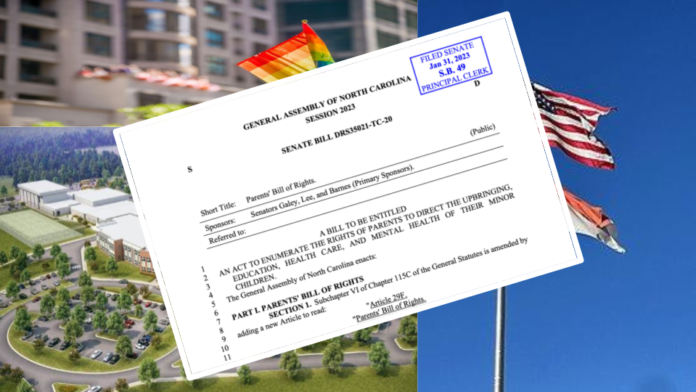On February 7th, 2023, North Carolina’s Senate passed Senate Bill 49, also known as the Parents’ Bill of Rights, which prohibits any teaching of sexual orientation and gender identity in grades K-4. The bill also requires K-4 parents to be notified by schools when students change their names, pronouns or identity.
While the bill purportedly builds communication with parents and their children, Senate Bill 49 fails to address the massive invasion of privacy that will affect young children.
Republican Senator Amy Galey, a co-sponsor of the Bill, claims the legislation is a victory for parents and will prevent teachers and other public school employees from “keep[ing] secrets” from parents.
“Parents have rights that we do not give up when we send our children to public-run schools. Parents are not afterthoughts,” she said. “Parents are charged with raising their children as they see fit, not in the way parents or other school employees see fit.”
Galey’s proposed legislation, though, fails to address the harm it could do to the LGBTQ+ community.
Democrats were opposed to the bill, specifically Senator Lisa Grafestin, who is the sole LGBTQ+ member in the North Carolina senate. In EdNC’s article, Grafestin rightly recognized the many consequences that the bill would cause in elementary schools and speculated the bill would create “widespread fear and concern.”
Though the bill targets elementary school students and staff, it affects all of education because, after all, elementary students graduate to middle and then high school, and, if they are not introduced to LGBTQ+ topics, they will have a limited worldview. Moreover, the bill may create anxiety for students who identify as queer or result in intolerance or bullying of the LGBTQ+ community.
Thankfully, the Chapel Hill Carrboro-City School (CHCCS) district issued a statement on February 17 on its Facebook and Instagram pages in opposition of the bill and in support of the LGBTQ+ community. The district characterized the bill as “another attempt to undermine the professional judgment of North Carolina’s educators.”
Many teachers in the school have appropriately been outspoken in their criticism of the Parents’ Bill of Rights. Social studies teacher Aaron Wark speculated the bill will create a “climate of fear where teachers and students are afraid to discuss queer issues far beyond what’s in the legislation.” He also believes the bill will create “aggressive homophobia” and paint subjects such as queer identity as a “dangerous thing.”
As would be expected, the Queer Student Alliance (QSA) is opposed to this bill, and the outrage from queer students is loud, strong and extremely insightful.
Junior Kennen Minozzi, who uses “he/they” pronouns, said that the bill is “a complete violation of students’ privacy and had nothing to do with someone’s actual education.”
Junior Felix Garret, who uses “he/him” pronouns, mentioned that instead of having LGBTQ+ topics censored by school administrators, these subjects should be taught in school to reduce the possibility of insecurity later as students discover themselves.
“We need to teach kids tolerance,” Garret insisted, recognizing that if kids are taught about LGBTQ+ topics, it could benefit their mental health, in addition to fostering a sense of belonging to their schools and communities.
It has been roughly one month since this bill has been passed, and the bill clearly will do harm not only to students in the classrooms, but also to teachers teaching the curriculum. While far right politicians argue that this is not a “Don’t Say Gay” Bill, it is hard to ignore all the clear anti-gay agenda items in the bill.












